
This is a demography of the population of Lebanon including population density, education level, health of the populace, economic status, religious affiliations and other aspects of the population.
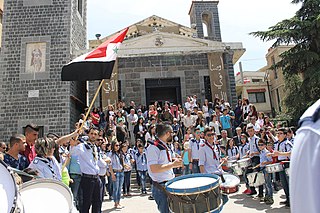
Arab Christians are ethnic Arabs, Arab nationals, or Arabic-speakers who follow Christianity. The number of Arab Christians who live in the Middle East was estimated to be between 10 and 15 million. Arab Christian communities can be found throughout the Arab world, but are concentrated in the Eastern Mediterranean region of the Levant and Egypt, with smaller communities present throughout the Arabian Peninsula and North Africa.
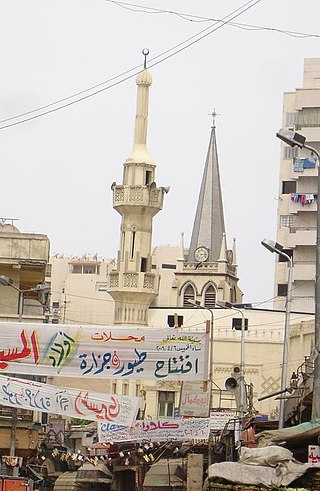
Religion in Egypt controls many aspects of social life and is endorsed by law. The state religion of Egypt is Islam, although estimates vary greatly in the absence of official statistics. Since the 2006 census religion has been excluded, and thus available statistics are estimates made by religious and non-governmental agencies. The country is majority Sunni Muslim, with the next largest religious group being Coptic Orthodox Christians. The exact numbers are subject to controversy, with Christians alleging that they have been systemically under-counted in existing censuses.

The Lebanese people are the people inhabiting or originating from Lebanon. The term may also include those who had inhabited Mount Lebanon and the Anti-Lebanon Mountains prior to the creation of the modern Lebanese state. The major religious groups among the Lebanese people within Lebanon are Shia Muslims (27%), Sunni Muslims (27%), Maronite Christians (21%), Greek Orthodox Christians (8%), Melkite Christians (5%), Druze (5.2%), Protestant Christians (1%). The largest contingent of Lebanese, however, comprise a diaspora in North America, South America, Europe, Australia and Africa, which is predominantly Maronite Christian.

The Catholic Church in Lebanon is part of the worldwide Catholic Church under the spiritual leadership of the Pope in Rome.

Christianity in Lebanon has a long and continuous history. Biblical Scriptures show that Peter and Paul evangelized the Phoenicians, whom they affiliated to the ancient Patriarchate of Antioch. Christianity spread slowly in Lebanon due to pagans who resisted conversion, but it ultimately spread throughout the country. Even after centuries of Muslim rule, it remains the dominant faith of the Mount Lebanon region and has substantial communities elsewhere.

Antiochian Greek Christians are an ethnoreligious Eastern Christian group native to the Levant. They are either members of the Greek Orthodox Church of Antioch or the Melkite Greek Catholic Church, and they have ancient roots in what is now Syria, Lebanon, Palestine, Jordan, the southern Turkish province of Hatay, which includes the city of Antakya —one of the holiest cities in Eastern Christianity, and Israel. Many of their descendants now live in the global Near Eastern Christian diaspora. They primarily speak Levantine Arabic.
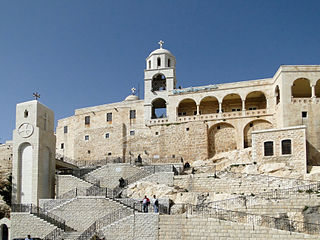
Christians in Syria made up about 10% of the pre-war Syrian population. The country's largest Christian denomination is the Greek Orthodox Church of Antioch, closely followed by the Maronite Church and the Assyrian Church of the East; the cities of Damascus and Aleppo are believed to have the largest number of Christians in Syria. There is a small minority of Protestants in the country.

Christianity in Kuwait is a minority religion.
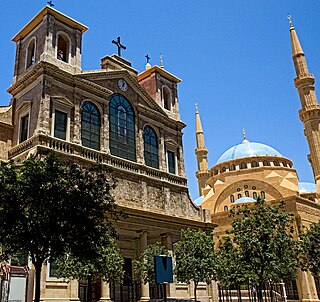
Lebanon is an eastern Mediterranean country that has the most religiously diverse society within the Middle East, comprising 18 recognized religious sects. The religions are Islam and Christianity. The Druze comprise around 5% of Lebanon's population.

Christianity, which originated in the Middle East during the 1st century AD, is a significant minority religion within the region, characterized by the diversity of its beliefs and traditions, compared to Christianity in other parts of the Old World. Christians now make up approximately 5% of the Middle Eastern population, down from 13% in the early 20th century. Cyprus is the only Christian majority country in the Middle East, with Christians forming between 76% and 78% of the country's total population, most of them adhering to Eastern Orthodox Christianity. Lebanon has the second highest proportion of Christians in the Middle East, around 40%, predominantly Maronites. Egypt has the next largest proportion of Christians, at around 10% of its total population. Copts, numbering around 10 million, constitute the single largest Christian community in the Middle East.
Islam is the official religion in Kuwait, and the majority of the citizen population is Muslim.
The Lebanese Constitution provides for freedom of religion and creeds and the exercise of all religious rites provided that the public order is not disturbed. The Constitution declares equality of rights and duties for all citizens without discrimination or preference but establishes a balance of power among the major religious groups. The government has generally respected these rights; however, the National Pact agreement in 1943 restricted the constitutional provision for apportioning political offices according to religious affiliation. There have been periodic reports of tension between religious groups, attributable to competition for political power, and citizens continue to struggle with the legacy of the civil war that was fought along sectarian lines. Despite sectarian tensions caused by the competition for political power, the Lebanese continue to coexist.

Maronites are a Syriac Christian ethnoreligious group native to the Eastern Mediterranean and Levant region of West Asia, whose members traditionally belong to the Maronite Church, with the largest concentration long residing near Mount Lebanon in modern Lebanon. The Maronite Church is an Eastern Catholic sui iuris particular church in full communion with the pope and the rest of the Catholic Church.
This article documents the status of various religions in the limited-recognition state of Northern Cyprus. Turkish Cypriots administer approximately one-third of the island.
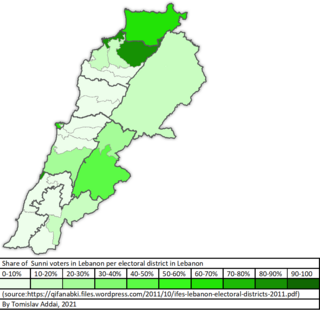
Lebanese Sunni Muslims refers to Lebanese people who are adherents of the Sunni branch of Islam in Lebanon, which is one of the largest denomination in Lebanon tied with Shias. Sunni Islam in Lebanon has a history of more than a millennium. According to a CIA 2018 study, Lebanese Sunni Muslims constitute an estimated 30.6% of Lebanon's population.

The Syro-Lebanese of Egypt, also known as Levantine-Egyptians or Syro-Egyptians, are an ethnic minority group in Egypt. They are Egyptians who have ancestry originating from the Levant, mostly what is now Syria and Lebanon, but also including those from Palestine. The majority of Egypt's historic Syro-Lebanese community is Christian, mainly Greek Orthodox and Eastern Catholic.

Islam in Lebanon has a long and continuous history. According to an estimate by the CIA, it is followed by 63% of the country's total population. Sunnis make up 31.9%, Twelver Shia make up 31.2%, next to smaller percentages of other Shia branches, such as Alawites and Ismailis. The Druze community is designated as one of the five Lebanese Muslim communities, even though most Druze do not identify as Muslims, and they do not accept the five pillars of Islam.
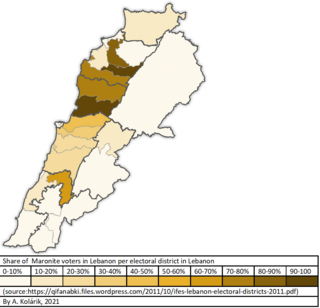
Lebanese Maronite Christians refers to Lebanese people who are members of the Maronite Church in Lebanon, the largest Christian denomination in the country. The Lebanese Maronite population is concentrated mainly in Mount Lebanon and East Beirut. They are believed to constitute about 30% of the total population of Lebanon.

The Catholic Church in the Middle East is under the spiritual leadership of the Pope in Rome. The Catholic Church is said to have traditionally originated in the Middle East in the 1st century AD, and was one of the major religions of the region from the 4th-century Byzantine reforms until the centuries following the Arab Islamic conquests of the 7th century AD. Ever since, its proportion has decreased until today's diaspora tendency, mainly due to persecution by Islamic majority societies. In most Islamic countries, the Catholic Church is severely restricted or outlawed. Significant exceptions include Israel and Lebanon.



















